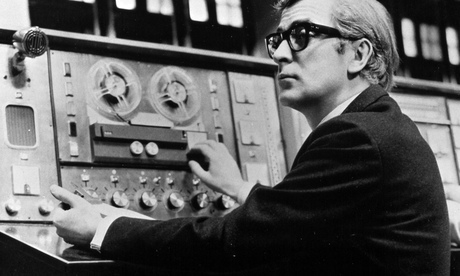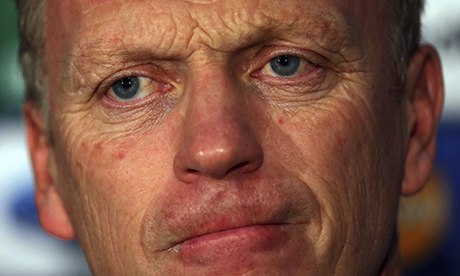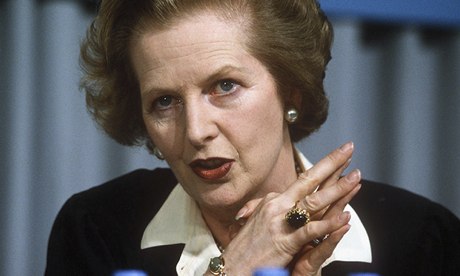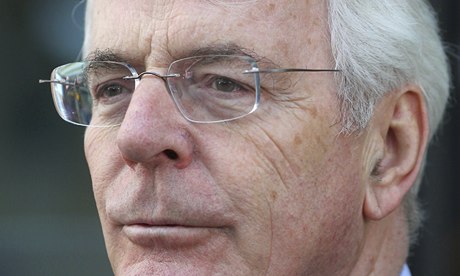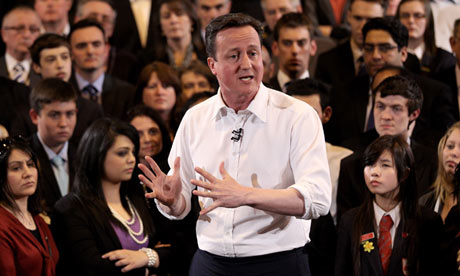
David Cameron at a secondary school in Bury in 2010. Photograph: Oli Scarff/Getty Images
If you want a good idea of where Britain might be headed, go to Peterborough. The city centre is smattered with the usual high-street names, and scores of empty shops (51, at the last count). Plenty of people complain about youth unemployment. The area of the city around a thoroughfare called Lincoln Road is a little Poland, smattered with businesses that also see to the needs of people from Portugal, the Baltic states, and more. Mention immigration, and you tend to get two kinds of response: tributes from recently arrived people to the kind of life that's possible in the UK, and angry, sullen opinions from locals who think advantages and opportunity are flowing in the wrong direction.
I spent a few days in and around the city a couple of months ago, and as well as all those issues, I was reminded of another very modern syndrome: the fact that as you progress down the age range, opinions about the job market and welfare state tend to harden, to the point that droves of twentysomethings sound like devout Thatcherites. In my regular trips around Britain for the Guardian's Anywhere But Westminster series, this has become almost a given. Quiz people under 30, in short, and you're more than likely to hear echoes of the kind of on-yer-bike, sink-or-swim values that decisively embedded themselves in British life when they were mere toddlers.
So it was in Peterborough, where I stopped for a chat with a young woman – born and raised in Cambridgeshire, it seemed – who was selling subscriptions to LoveFilm, next to a row of empty retail outlets and a branch of Caffe Nero. "British people are rubbish," she said. "Lads especially need to be pushed into jobs more."
"I think they need to stop letting people into the country, to start with," she went on, and then paused. "And stop jobseeker's, as well. I don't think it's right."
This was a reference to
jobseeker's allowance, the benefit that pays unemployed people under 25 the princely sum of £56.80 a week. "There are hardly any people that are willing to go and get any job that's out there, just to say: 'I've earned that money'," she continued. "They want the best, don't they?"
At this point, my lefty, bleeding-heart soul could take no more, and I blurted out a riposte. Don't they just want to be paid seven or eight quid an hour and be treated with some respect?
"I was on £6.55 in my last job," she said. "If you don't want to go to college, start at the bottom and work your way up."
Such are the prevailing opinions of what pollsters call Generation Y, the millions of people born between 1980 and 2000, who have grown up in a country in which postwar collectivism is increasingly but a distant memory, and the free-market worldview handed on from Thatcher, to Major to Blair and Brown and now Cameron, is seemingly as ordinary and immovable as the weather. I have heard much the same stuff in Manchester, Birmingham, Swansea, Brighton and beyond. This is not a view of things, moreover, solely borne out by random vox pops: careful, long-term research highlights exactly the same things, in spades.
Earlier this year, the polling company Ipsos MORI began to publish the fruits of its work on 17 years' worth of polling results, spread across four generations, starting with those born in 1945 or before, and ending with Generation Y. Among the most striking examples of a yawning gap between the generations was their respective responses to the claim that "the government should spend more money on welfare benefits for the poor, even if it leads to higher taxes" – a signifier for the principle of redistribution, support for which has fallen among all generations over the past 20 or so years. Here, though, is the remarkable thing: whereas around 40% of those born in 1945 or before still agree, the numbers tumble as you move down the age range, reaching around half that figure among those aged 33 and under. Similarly, among Gen Y, the claim that "the creation of the welfare state is one of Britain's proudest achievements" is now supported by around 20% of people; when it comes to the prewar cohort, the figure always hovered at around 70%.
 Adele said her tax bill made her: 'ready to go and buy a gun and randomly open fire'. Photograph: Jason Merritt/Getty Images
Adele said her tax bill made her: 'ready to go and buy a gun and randomly open fire'. Photograph: Jason Merritt/Getty Images
This, says Ipsos MORI's accompanying blurb, "clearly raises important questions about the future of the welfare state". It certainly does, and the point is fleshed out by poll after poll. In research done by ICM in March, for example, the idea that most unemployed people receiving benefits were "for the most part unlucky rather than lazy" was rejected by 48% of 18- to 24-year-olds, and 46% of 25- to 34-year-olds, who apparently agreed with what we now know as the striver/skiver divide.
Look at the polling data relating to other issues and one thing becomes clear.
In many ways, Gen Y is admirably socially enlightened: its support for gender equality and gay rights is overwhelming, and on such ideas as the wearing of traditional dress in state schools, its live-and-let-live mores tower over those of older generations. Moreover, among its younger members, the fusty, nostalgic politics of Ukip seems to have very limited appeal: when the party scored its highest ever ICM poll rating back in May, though its support among the 25-34s stood at 21%, the figure for the 18-24s was a comparatively paltry 8%.
A large share of Generation Y seems to build its opinions around a liberalism that is both social and, crucially, economic. This, conveniently, also forms the core of the modern Toryism espoused by David Cameron and George Osborne.
Which brings us to the next revelation, which reached the media last week. Though the under-34s are less keen on the idea of political loyalty than older cohorts, latter-day Tories have apparently managed to speak to a creditable swath of Gen Y, and pull off an amazing political feat. When Cameron took over the Tory leadership in 2005, the party's support among Generation Y stood at 10%. It has since more than doubled, to 20.5%: when Osborne gets up to deliver his latest spending review and serve further notice that the state must be hacked back, and the economy must somehow be rebalanced between private and public, large numbers of young people will apparently be in full agreement.
One recent YouGov poll put support for the Tories among the 18-24s at 31%, with Labour trailing at 27%. By way of a contrast, Tory support among those aged 40-59 was at 29%, with Labour on 40%. In other words, the time-worn wisdom about politics and the young may be in the process of being turned on its head. Welcome, then, to yet another element of the New Normal, and a sobering fact: when it comes to questions about the welfare state, work and the like, the younger you are, the more rightwing you're likely to be.
At which point, some caveats. I'm a comparatively ancient 43, and it has always seemed to me that my own generation – X, the pollsters call it – has been something of a washout. We seemed to be rendered punch-drunk by Thatcherism, holding on to a vague affection for the postwar welfare state – we could get the dole with no questions asked, after all – and being stunned into silence by the social and political revolution that began in our childhood, and was firmly embedded by the time we reached our 20s. For a time, many of us switched off from politics altogether. On that score, I have always liked
a sentence written by that eminent Gen X-er Zadie Smith: "I saw the best minds of my generation accept jobs on the fringes of the entertainment industry."
At least part of Generation Y, by contrast, seems to be not just angry with the ever-rightward drift of politics, but more than prepared to take the kind of action at which most of my lot would have balked. It seems outraged by such issues as the marketisation of higher education, the position of the super-rich, and the all-pervasive effects of austerity. If you doubt this, consider the events of November 2010,
when all those students laid siege to the Conservative party's HQ at Millbank, and trashed it, along the way spurning the kind of tepid politics espoused by the leadership of the NUS. Note also the fired-up voices who have given Generation Y a huge political visibility: the columnist and author
Owen Jones, the left-feminist
Laurie Penny, the people who have clustered around such brilliantly trailblazing groups as
UK Feminista,
People and Planet and
UK Uncut.
And yet, and yet. Might the true views of Gen Y have been better summed up by 23-year-old Adele Adkins, whose response to the brief era of a 50% top rate of tax oozed the stuff of post-Thatcher individualism? Just to recap: "I'm mortified to have to pay 50%. I use the NHS, I can't use public transport any more. Trains are always late, most state schools are shit, and I've got to give you, like, four million quid – are you having a laugh? When I got my tax bill in from [the album] 19, I was ready to go and buy a gun and randomly open fire." Lovely.
Not that one should set huge store by the often frazzled views of mere pop stars and celebs, but it may also be worth noting that Harry Styles (19)
issued a mournful tweet about the death of Margaret Thatcher, and that the Marx-like oracle
Rylan Clark (24) described her as a "legend" before affecting to think better of it. At the upper end of the Gen Y age range, consider also
the infamous views of Frank Turner, the 31-year-old old-Etonian singer who apparently thinks that when it comes to the relationship between government and the individual, there should be an emphasis on "minimising the impact on ordinary people's lives … allow[ing] them to get on with their lives and not be bothered by the state. Then you've suddenly got a range of things to talk about that are achievable. Like everything from not having ID cards and trying to dismantle the surveillance system we've put together in this country on the one hand, trying to remove government from people's lives, social services. Letting people be freer, health and safety, whatever it might be." On the face of it, that all chimes brilliantly with the aforementioned polling.
But never mind pop stars and singer-songwriters. In the real world, what's often most remarkable about the Gen Y worldview is the way it extends even to people who, on the face of it, might have very good reason to think that economic liberalism and hostility to the welfare state have done them very few favours at all.
Last year,
I went to Warrington, the sprawling Cheshire town that shares with Peterborough the sense of somehow being modern Britain incarnate. I was there to
have a look at the local version of the Work Programme, the government initiative that aims to get people suffering long-term unemployment back into work, apparently by convincing them that joblessness is usually the result of character failings rather than the state of the economy.
There, I met a 27-year-old man who had just managed to re-enter the world of work, though the only thing he could find was a temporary contract delivering sofas. Around us were shelves peppered with self-help books; the people in charge assured me that even if work seemed thin on the ground, the people they supervised could always look for "hidden jobs". So I wondered: did he think that the fact he was unemployed was his fault?
His reply was just this side of heartbreaking. "Yeah," he said. "I do. I think I should have applied for more. I should have picked myself up in the morning, got out, come to a place like this – tried more. When you're feeling down, you start blaming the world for your mistakes – you feel the world owes you. And it doesn't. You owe the world: you have to motivate yourself, and get out there, and try."
